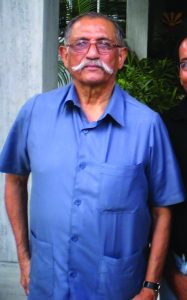 Former army chief General Shankar Roychowdhury has said the report of the Central Vigilance Commission (CVC) on defence deals since 1986 indicated that suspicions raised by the Tehelka exposé were not baseless.
Former army chief General Shankar Roychowdhury has said the report of the Central Vigilance Commission (CVC) on defence deals since 1986 indicated that suspicions raised by the Tehelka exposé were not baseless.
“This (CVC) report promises to be an immensely more authentic ‘tehelka’ regarding dirty tricks in the defence procurement business,” Roychowdhury said, in an article in the forthcoming issue of Indian Defence Review.
He said that the secret report indicated the involvement of bureaucrats, politicians and arms brokers, which showed that “the suspicions raised by the Tehelka Tapes were not baseless.”
Roychowdhury, who is also an independent Rajya Sabha Member of Parliament from West Bengal, asked the government to “prove its bonafides by following up the wrong doings which find mention in the N Vittal (chief vigilance commissioner) document and follow these up relentlessly.”
Stating that the Tehelka exposé was a “watershed in terms of ethics and moral values” in the army, Roychowdhury said, “The tapes have confronted the army with a battle for the heart and minds of its own people and it is a battle it cannot afford to lose.”
Army personnel had been “deeply disturbed at the obscene spectacle of senior army officers consuming free scotch whisky provided by fly-by-night carpetbaggers chaperoned into their presence by the clerical cadre of the defence ministry,” the former army chief said.
“We have to expect the Bollywood to get into the act now, by adding senior army officers to its portfolio of screen villains, which so far by and large had remained restricted to politicians, businessmen and senior police officers only,” he said.
Roychowdhury quoted a Major serving on the Line of Control (LoC) as saying, “We too watch the television and read newspapers…we know the army does not spare anyone who is involved in the most minor instance of wrongdoing. We are waiting, sir, to see whether the senior people who are involved will be treated likewise, or will they get away with their misdeeds.”
Describing the Major’s reaction as “grave”, he said it indicated the reaction to the entire episode within the “real army, and provides a glimpse of the suppressed anger within a proud organisation.”
Stating that the prestige of the army and its personnel had “sunk to an unprecedented low,” he said that restoration of self-esteem and redemption of “izzat” (respect) would require a determined effort.
letters@tehelka.com












